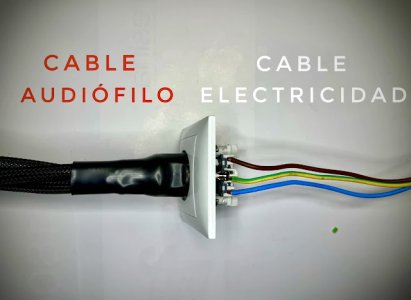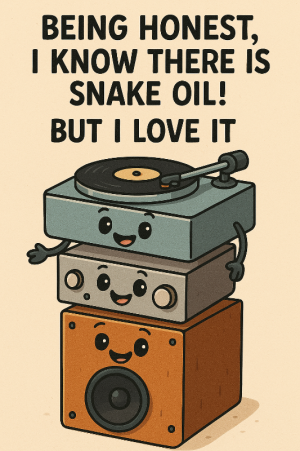BowsAndArrows
Major Contributor
This thread was inspired by a statement by @CliffyBC in another thread... @AudioPervert 's thread https://forum.wiimhome.com/threads/snake-oil-or-good-upgrade.6845/
ofc nothing personal - was just a really interesting comment that got me thinking!!
i'm just fascinated by the arrogance in a statement like that... let me explain.
let me explain.
take - for example - "upgrading" speakers. this is something that we can all probably agree - is clearly NOT snake oil. right??
ok, so then you might ask yourself what is it about a particular speaker that makes it better than another??
is it using better parts (e.g. high end poly or foil capacitors vs cheap electrolytic ones) to construct it's crossover??
more exotic materials (beryllium anyone? ) to make the diaphragm of the drivers??
) to make the diaphragm of the drivers??
thicker/more inert/heavier construction to reduce cabinet resonances??
some sort of gel suspension system for the whole shebang??
go talk to speaker designers/engineers or read on their websites about what the upgrades are on the newer models vs the older models, and you'll realise that a lot of the specific stuff they mention would be dismissed as snake oil in any other context... for example - many manufacturers proudly tout something like "all internal wiring is cardas copper + high-Ag solder" etc etc. but if anyone asks about upgrading the interconnects in their system - they get snarky, know-it-all comments about how you couldn't possibly be thinking straight.
not sure that kind of response makes sense, tbh. especially when you consider that engineers today are working on stuff that was considered snake oil not so long ago. all i'm saying is that we should stay humble - know the limitations of our knowledge currently, and have an open mind.
i'm not for one second saying that we should not be inquisitive/skeptical of these new, sometimes insanely expensive products that hifi companies want to sell us. but we should also not assume that we know everything there is to know about certain topics, either!
anyways, rant over - feel free to crucify me in the comments for being a heretic!!

ofc nothing personal - was just a really interesting comment that got me thinking!!
really? that simple, huh?Snake oil or good upgrade?
If you have to ask the question, you already know the answer.

i'm just fascinated by the arrogance in a statement like that...
take - for example - "upgrading" speakers. this is something that we can all probably agree - is clearly NOT snake oil. right??
ok, so then you might ask yourself what is it about a particular speaker that makes it better than another??
is it using better parts (e.g. high end poly or foil capacitors vs cheap electrolytic ones) to construct it's crossover??
more exotic materials (beryllium anyone?
thicker/more inert/heavier construction to reduce cabinet resonances??
some sort of gel suspension system for the whole shebang??
go talk to speaker designers/engineers or read on their websites about what the upgrades are on the newer models vs the older models, and you'll realise that a lot of the specific stuff they mention would be dismissed as snake oil in any other context... for example - many manufacturers proudly tout something like "all internal wiring is cardas copper + high-Ag solder" etc etc. but if anyone asks about upgrading the interconnects in their system - they get snarky, know-it-all comments about how you couldn't possibly be thinking straight.
not sure that kind of response makes sense, tbh. especially when you consider that engineers today are working on stuff that was considered snake oil not so long ago. all i'm saying is that we should stay humble - know the limitations of our knowledge currently, and have an open mind.
i'm not for one second saying that we should not be inquisitive/skeptical of these new, sometimes insanely expensive products that hifi companies want to sell us. but we should also not assume that we know everything there is to know about certain topics, either!
anyways, rant over - feel free to crucify me in the comments for being a heretic!!



